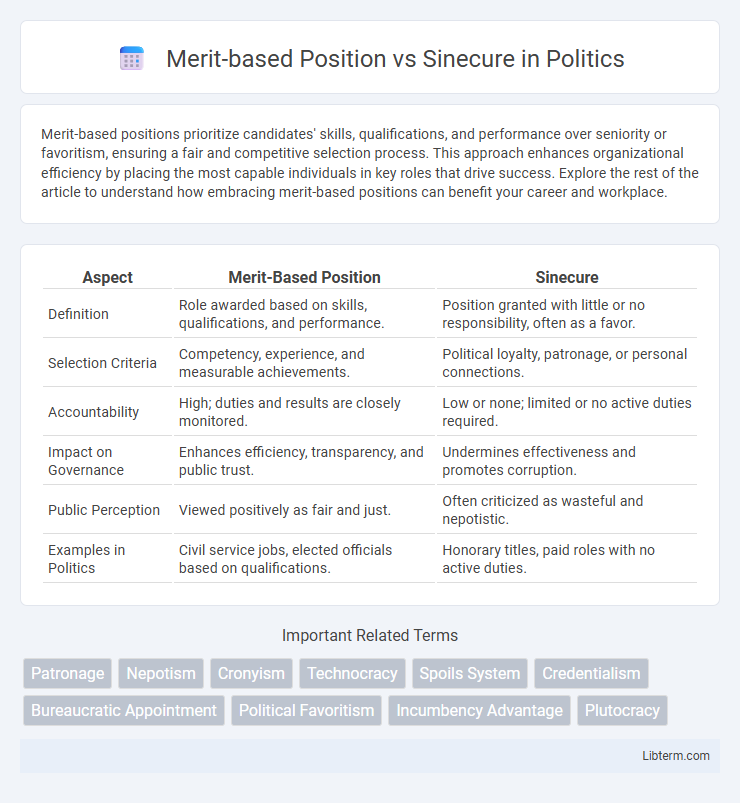Merit-based positions prioritize candidates' skills, qualifications, and performance over seniority or favoritism, ensuring a fair and competitive selection process. This approach enhances organizational efficiency by placing the most capable individuals in key roles that drive success. Explore the rest of the article to understand how embracing merit-based positions can benefit your career and workplace.
Table of Comparison
| Aspect | Merit-Based Position | Sinecure |
|---|---|---|
| Definition | Role awarded based on skills, qualifications, and performance. | Position granted with little or no responsibility, often as a favor. |
| Selection Criteria | Competency, experience, and measurable achievements. | Political loyalty, patronage, or personal connections. |
| Accountability | High; duties and results are closely monitored. | Low or none; limited or no active duties required. |
| Impact on Governance | Enhances efficiency, transparency, and public trust. | Undermines effectiveness and promotes corruption. |
| Public Perception | Viewed positively as fair and just. | Often criticized as wasteful and nepotistic. |
| Examples in Politics | Civil service jobs, elected officials based on qualifications. | Honorary titles, paid roles with no active duties. |
Understanding Merit-Based Positions
Merit-based positions prioritize candidates' qualifications, skills, and performance to ensure fairness and efficiency in recruitment. These roles often involve transparent evaluation criteria such as exams, experience, or demonstrated competencies, promoting accountability and organizational effectiveness. Understanding merit-based systems highlights the contrast with sinecure positions, which lack substantive duties and may not require merit for appointment.
Defining Sinecure: Meaning and History
A sinecure is a position that requires little to no responsibility or active work but provides financial benefit or status, historically rooted in ecclesiastical or governmental offices during medieval Europe. Unlike merit-based positions where appointments depend on qualifications and performance, sinecures often served as honorary titles or pensions, sometimes used to reward loyalty or service without demanding specific duties. The term originates from the Latin phrase "sine cura," meaning "without care," emphasizing its nature of an office held without the burden of regular duties.
Key Differences: Merit-Based vs Sinecure
Merit-based positions require candidates to demonstrate skills, qualifications, and performance, ensuring appointments are earned through competence and achievement. Sinecures provide roles with salary or benefits but minimal actual duties, often awarded as favors without regard to merit or performance. The key difference lies in merit-based positions emphasizing accountability and measurable results, while sinecures prioritize status or patronage with limited responsibilities.
Advantages of Merit-Based Employment
Merit-based employment ensures that positions are awarded based on qualifications, skills, and performance, leading to higher efficiency and productivity within organizations. Employees hired through merit systems tend to demonstrate greater accountability and motivation, fostering a culture of excellence and continuous improvement. This approach reduces favoritism and nepotism, promoting fairness and equal opportunity in the workplace.
Drawbacks of Sinecure Roles
Sinecure roles often lack accountability and clear performance metrics, leading to inefficiency and potential misuse of organizational resources. These positions can undermine meritocratic principles by rewarding tenure or favoritism rather than skill and achievement. Consequently, sinecure appointments may demotivate high-performing employees and inhibit overall organizational productivity.
Impact on Organizational Performance
Merit-based positions enhance organizational performance by ensuring employees are selected and promoted based on skills, experience, and achievements, leading to higher productivity and innovation. In contrast, sinecure roles, often involving minimal responsibilities or output, can lead to decreased motivation and inefficiency within the organization. Prioritizing meritocracy fosters a culture of accountability and drives sustainable growth, while sinecures may undermine team dynamics and resource allocation.
Recruitment and Fairness in the Workplace
Merit-based positions ensure recruitment processes emphasize qualifications, skills, and performance, promoting fairness and equal opportunity within the workplace. Sinecure roles often bypass competitive recruitment, risking favoritism and undermining meritocratic principles. Transparent hiring practices linked to merit foster employee motivation and organizational efficiency, contrasting with the potential inequity associated with sinecure appointments.
Risks of Sinecures: Corruption and Inefficiency
Sinecure positions pose significant risks of corruption due to lack of accountability and motivation, often resulting in mismanagement of resources and favoritism. Inefficiency arises as sinecure holders are not required to perform substantive duties, leading to diminished organizational productivity. Merit-based positions, in contrast, enforce competence and performance standards that reduce opportunities for unethical behavior and operational waste.
Promoting Meritocracy in Modern Institutions
Merit-based positions prioritize skills, qualifications, and performance to promote fairness and efficiency, reinforcing meritocracy in modern institutions. Sinecures, characterized by titles with little responsibility or accountability, undermine these principles by allowing unearned privileges. Emphasizing merit-based selection enhances institutional credibility, motivation, and overall effectiveness in governance and organizational success.
Future Trends: Evolving Work Paradigms
Merit-based positions are increasingly favored in future work paradigms due to their focus on skills, performance, and accountability, fostering innovation and efficiency. Sinecure roles, characterized by minimal duties and guaranteed benefits, face declining relevance as organizations prioritize agility and measurable contributions. Advancements in AI and data analytics will further reinforce meritocratic systems by objectively assessing employee performance and potential.
Merit-based Position Infographic

 libterm.com
libterm.com